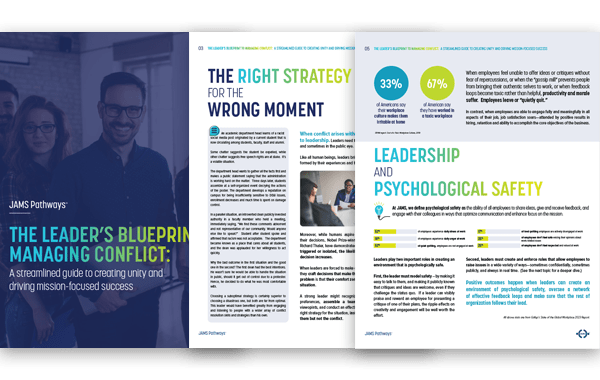Key Terms & Glossary
What are conflict resolution skills?
Conflict resolution skills are the abilities one employs to address and amicably settle disagreements or resolve conflicts. They foster a productive, respectful environment where parties involved can express their viewpoints and work together towards mutually beneficial solutions. These skills include active listening, effective communication, negotiation, empathy, mediation, problem-solving, decision-making, emotional intelligence, the ability to manage and regulate emotions during tense situations and leadership. Your leadership and employees can acquire the necessary conflict resolution skills with one-to-one meetings, tailored conversations, and workshops as part of our Conflict Prevention & Resolution Program.
What is conflict resolution in the workplace?
Conflict resolution in the workplace refers to the processes and strategies used to mitigate conflicts among employees or teams. This proactive approach aims to transform conflict into an opportunity for growth, innovation, and better business performance. By using conflict resolution techniques, organizations can foster collaboration and productivity in the work environment, improve communication, boost employee satisfaction, and prevent long-term damage to work relationships.
What is the first step in conflict resolution?
The first step in conflict resolution, as utilized in our Conflict Prevention & Resolution Program, is a Preliminary Assessment, which is finding the source of conflict. This involves an in-depth review of the work culture, interviewing or surveying key stakeholders to understand the organizational goals and uncover potential impediments to team success. Identifying challenges and needs upfront is crucial to establishing an effective course of action for conflict resolution.
What are conflict resolution strategies?
Conflict resolution strategies are methods used to address and resolve disputes effectively and positively. They often involve active collaboration, compromise, communication, strategic negotiation, problem-solving, mediation, fostering positive relationships, leveraging expertise, demonstrating leadership, promoting open feedback, and continuous improvement. These strategies aim to promote a culture where open, honest communication and collaboration prevail over conflict.
What are the 4 steps of conflict resolution?
The four steps in our phased conflict resolution approach include: Preliminary Assessment, where challenges and needs are identified; Analysis and Intervention, where a customized resolution path is outlined; Targeted topics, workshops and conversations, where solutions are forged together via negotiation, compromise or mediation; and Highlighting Process and Mapping Next Steps, where successes in resolving the conflicts are reviewed and a strategic roadmap for continuous improvement is created to prevent future conflicts.
What are the benefits of conflict resolution?
Proper conflict resolution can transform workplace challenges into opportunities for growth, enhancing team unity and boosting business performance. Benefits include improved communication, increased employee satisfaction, higher productivity, reduced turnover, an inclusive and positive work environment, and ultimately, stronger bottom-line business results.
What are the principles of conflict resolution?
The principles of conflict resolution include fairness and neutrality, where no agenda is pushed and no sides are taken; respect, confidentiality, and inclusivity, fostering every stakeholder's involvement; effective early intervention with empathy and open communication, preventing further escalation of conflict; and collaboration and problem solving, tailoring beneficial solutions for all parties. These principles aim to create a safe, balanced, and respectful environment for resolving conflicts.
What is avoidance in conflict resolution?
Avoidance in conflict resolution refers to the act of consciously staying away from or ignoring conflicts rather than addressing them. While it may provide temporary relief, this passive strategy often allows conflicts to fester and escalate, potentially leading to more serious repercussions. Addressing conflicts proactively and constructively is key to fostering a productive work environment. You can prevent avoidance in conflict resolution with specifically tailored workshops and one-on-one training provided by JAMS Pathways.
What is collaboration in conflict resolution?
Collaboration in conflict resolution is resolving a conflict with cooperation and effective communication. It involves working together to find an amicably agreed upon resolution that satisfies all parties. It's about open communication, understanding different perspectives, and jointly developing beneficial solutions. Collaboration fosters positive relationships, mutual respect, and a cooperative culture that values individual input and shared decision-making.
What is compromise in conflict resolution?
Compromise in conflict resolution is a strategy where each party involved agrees to give up something to reach a mutually agreeable solution. It's about finding middle ground, making concessions, to reach an outcome that fosters harmony. Although each party may not get everything they wanted, a compromise can lead to progress and help minimize conflict.
What is conciliation in conflict resolution?
Conciliation in conflict resolution is a process where an impartial third-party facilitates a dialogue between conflicting parties to help them reach an agreement. The conciliator usually does not propose solutions but helps the parties restore communication, understand each other’s perspectives, and guide them towards a positive resolution. It's a confidential process that aims to restore damaged work relationships and rebuild trust.
What is conflict resolution training?
Conflict resolution training is a customized skill-building program targeted towards fostering an environment that effectively transforms conflicts into opportunities for growth. It incorporates guided role-playing exercises and live presentations to engage teams in real-world scenarios. This training helps participants learn to appreciate different perspectives, enhance their communication and negotiation techniques, and be more objective, empathetic, and proactive when handling disputes.
What are effective conflict resolution and teamwork skills?
Effective conflict resolution and teamwork skills refer to the competent combination of communication, active listening, empathy, and decisiveness. These abilities permit team members to manage disagreements constructively, fostering a more harmonious and productive work environment. The objective is not to avoid conflicts, but to navigate them successfully via enhancing collective problem solving and decision-making processes in a way that consolidates team unity, and boosts business performance.
What is a healthy conflict resolution?
A healthy conflict resolution involves addressing conflicts respectfully, constructively, and transparently in a non-destructive manner that encourages understanding, respect, and growth. It necessitates open and unbiased dialogue, the capacity to appreciate divergent opinions, and the readiness to compromise. In a healthy conflict resolution process, all parties involved feel heard and respected, ultimately leading to finding a mutually satisfying solution.
What is negotiation in conflict resolution?
Negotiation in conflict resolution is a collaborative dialogue where all parties involved explore potential solutions to their disagreement. The objective is to reach an agreement that represents the best shared interests and compromises among them. Strategic negotiation skills, such as open communication, active listening, and empathy aid in smoothing friction and transforming obstacles into opportunities for collaboration.
What is positive conflict resolution?
Positive conflict resolution is a process that transforms conflicts into opportunities for growth and development. Instead of escalating disputes, it seeks to uncover the root causes, encouraging open discussions and exploring feasible solutions tailored to everyone's needs. This approach generates a common understanding and establishes a groundwork for future successful interactions.
What is the difference between conflict management and conflict resolution?
Conflict management is the process of minimizing the negative aspects of conflicts while maximizing learning and positive outcomes. On the other hand, conflict resolution aims to directly address and solve disputes with the goal that they don't recur. While the former helps to manage ongoing issues in a productive way, the latter is focused on finding long-term solutions.
What is the win-win approach to conflict resolution?
The win-win approach to conflict resolution is a collaborative technique where all parties work together to find a mutually beneficial solution. It views conflicts as creative opportunities to explore new ideas or possibilities. The idea is that nobody should lose; instead, everyone should walk away satisfied, leading to improved relationships and common understanding. The win-win approach promotes mutual respect, empathy, trust, and shared success in conflict resolution processes.
What are some barriers to conflict resolution?
Barriers to conflict resolution can range from inadequate communication, cultural and personality clashes, lack of empathy or understanding, conflict of interests to power dynamics and differing interests. Other obstacles include lack of neutrality, avoidance of issues, and lack of trust among involved parties. These barriers may prevent the resolution process, escalate conflict, and impede efforts to find common ground or reach mutually beneficial solutions. These barriers can be overcome with the JAMS Pathways PATH Program’s, which promotes patience, open communication, and alternative perspectives.
What are some leadership skills for conflict resolution?
Leadership skills for conflict resolution often involve active listening, effective communication, empathy, problem-solving, negotiation, mediation, decision-making, and the ability to influence. Leaders must also be decisive, exhibit emotional intelligence, and have the ability to handle stressful situations tactfully. Strong leaders can navigate conflicts diplomatically, inspire trust and respect, and guide individuals towards constructive resolutions that promote unity and productivity within the organization. With the JAMS Pathways leadership training, you can equip your leadership with the necessary skills to de-escalate conflict, build trust and motivate their teams to boost workplace performance.
What can conflict resolution skills help you do?
Conflict resolution skills aid individuals in breaking the vicious cycle of disputes, turning conflicts into opportunities for success. These skills foster effective communication, the ability to address conflict constructively, enhance teamwork, and contribute to a more inclusive and positive workplace environment. By mastering conflict resolution skills, individuals can navigate conflicts with confidence and professionalism. This can boost employee engagement, productivity, and overall business performance.
What does a conflict resolution company do?
A conflict resolution company assists organizations in transforming conflict into business performance. They offer tailored training programs and interventions, focusing on identifying the root causes of disputes; analyzing the arguments of every stakeholder for early intervention; facilitating candid conversations with one-on-one dialogues, training, and workshops; and developing a roadmap for continuous improvements. Combining neutrality and inclusivity, they strive to create the necessary conditions for long lasting change and providing peace in the workplace.
What does a conflict resolution professional do?
A conflict resolution professional is trained to facilitate dialogue, mediate disputes, negotiate agreements, manage conflicts, and assist parties in resolving disputes peacefully and constructively. A conflict resolution professional guides teams through challenging discussions, helping to uncover issues and develop tailored solutions. They play an impartial role, fostering a safe and confidential space for all team members, while providing applying their experience and insight to addressing a variety of conflicts. Their goal is to restore broken communication, create an environment of trust, and push for positive change in the workplace.
What is the importance of negotiation in conflict resolution?
Negotiation is a vital component of conflict resolution. It allows parties to identify shared interests, find common ground and collaboratively design win-win solutions. Negotiation fosters mutual understanding, respect, and cooperation, turning potential obstacles into opportunities for collaboration and growth.
What is the role of compromise in conflict resolution?
Compromise plays a pivotal role in conflict resolution. Without the willingness to compromise, finding a mutually acceptable solution could be challenging. Compromise requires flexibility, empathy, and a willingness to collaborate in finding solutions that address the underlying issues while respecting the needs and priorities of all parties involved. It facilitates the resolution process by enabling all parties to make concessions for the greater good, maintaining harmony and teamwork, and ensuring a more inclusive and satisfactory outcome.

Start Your Journey Now
Schedule a complimentary appointment to assess your needs
Restore workplace unity and maximize employee performance.
Customized Client Solutions
There’s no one way to run a healthy organization, and our pricing is as customized as our approach.
Download our streamlined guide
The Leader's Blueprint to Managing Conflict
In this practical, step-by-step playbook, our experienced facilitators explain how to efficiently resolve workplace conflict to create unity and drive mission-focused success.

